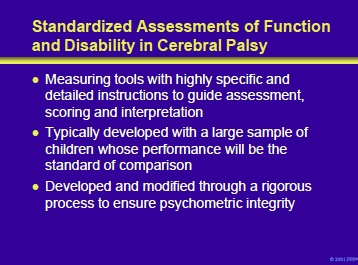Page 15 of 26

Standardized tools are used to assess function and disability in patients with cerebral palsy. The measuring tools are highly specific with detailed instructions to guide assessment, scoring and interpretation.
They are typically developed with a large sample of children whose performance will be the standard of comparison. They are then developed and modified through a rigorous process to ensure psychometric integrity.
Failure to use the standard measures to assess function and disability may result in the following:
- Variations in observations across assessments (ie, memory is not very reliable)
- Errors of omission and commission in gathering evidence
- Tendency to record “impressions” rather than evidence
- Tendency to focus on impairment deficits rather than functional performance
Considerations when selecting an instrument include:
- Goals of the assessment
- Aspects to be measured
- Intended population
- Age-span covered by the instrument
- Intended range in level of involvement
- Any need for special equipment and training
- Ease of scoring and interpretation
- Clinical usefulness of results
Add comment